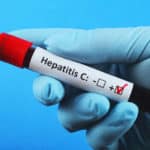Vitamins Suggested During Combination Therapy
Vitamins E and C May Aid Patients with Hepatitis C on Conventional Treatment
In a study involving 30 patients with chronic hepatitis C who were receiving interferon-alpha-2b (IFN-alpha-2b) and ribavirin combination therapy, daily supplementation with vitamin E (500 mg/day) and vitamin C (750 mg/day) was found to improve the fatty acid composition of mononuclear cells. At baseline, all study subjects were found to have a lower level of EPA (eicosapentaenoic acid) and a higher level of the molar ratio of arachidonic acid to EPA in mononuclear cells, as well as a significant correlation between the molar ratio and the level of serum alanine aminotransferase, as compared with healthy volunteers. After intervention, subjects who did not receive nutritional supplementation (the “non-vitamin group” – 16 subjects) experienced a significant decrease in the EPA levels of mononuclear cells at 4 and 8 weeks into treatment, while subjects who received vitamins E and C daily (the “vitamin group” – 14 subjects) maintained the EPA level of mononuclear cells. Both groups experienced a significant decrease in serum levels of alanine aminotransferase two weeks into the treatment. In addition, the “vitamin group” was found to have increased levels of plasma and red blood cell alpha-tocopherol and plasma ascorbic acid levels. These results suggest that patients with hepatitis C who are undergoing IFN-alpha-2b and ribavirin therapy may benefit from supplementation with the antioxidant vitamins, E and C, through their effect on maintaining the level of EPA in mononuclear cell phospholipids. The authors hypothesize that the efficacy of IFN-alpha-2b and ribavirin therapy might be further improved through oral supplementation with EPA. Further research would be needed to test this hypothesis.
Reference
“Vitamin E and C supplementation prevents decrease of eicosapentaenoic acid in mononuclear cells in chronic hepatitis C patients during combination therapy of interferon alpha-2b and ribavirin,” Murakami Y, Nagai A, et al, Nutrition, 2006; 22(2): 114-22. (Address: Department of Nutritional Science, Faculty of Health and Welfare Science, Okayama Prefectual University, Okayama, Japan).







